Shadyrainy - 無標題

More Posts from Shadyrainy and Others
Since I was dead before I was born.
うまれるまえは

“OOH CHRISTOPHER PIERRE” (a Ghost and Pals fanfiction)
Hi guys this is literally the worst thing I’ve ever drawn
I know people are just joking when they say stuff like “Mithrun is an old grandpa he doesn’t know he can’t say those words anymore he doesn’t know they don’t have any book tokens anymore” because of these extras below:


and whatever but like it honestly drives me kind of crazy. Like can we look at this for a second.

He was the lord of the dungeon for five years. Then he was being rehabilitated for TWENTY YEARS. That’s not super long for elves, that’s like four years for us, but that’s still a long time. And then he was the captain for another fourteen years, but he didn’t have any desire other than getting revenge on the demon.
Mithrun hasn’t really been properly socialized for a total of FORTY YEARS, which is like eight years for elves. He was totally shut off from the world, then he was rehabilitated, and then he was with the Canaries on a onetrack mindset to go after the demon. Mithrun was doing bad, he was recovering, and then he was better enough to be the captain of the Canaries again, but he was still not “better.” In all that time, the world didn’t wait for him when he was at his low point. It didn’t wait for him when he was spending all that time recovering. And by the time it’s near the end of the story where these comics take place he’s just been so far detached from the world. Like he’s most likely never tried to go buy a book token after becoming a dungeon lord. He’s most likely never talked to people and learned the new slang of the time, he’s never been caught up which words are good versus outdated. Mithrun is technically better enough to be captain, he’s better enough to have reintegrated into society, but he’s not quite adjusted yet. He’s been out for so many years suffering under the hands of the demon and scraping his way through recovery and trying to work to get to the demon that by the time he’s stopped and done stuff like gift exchanges or whatever many aspects of the world are vastly different from what he remembers. I think that’s a lot like a lot of people in real life too who have similar experiences. People in mental health centers or hospitals who spends even just months recovering can miss out on so much.
Does this make any sense? It’s kind of late so I don’t really know what I’m saying and I’m probably repeating myself but like Mithrun was at a low point and then he was recovering for so long!!!! And then when he’s reintegrated back into the world it’s changed without him!!!! He’s not some racist old man!!! The world just kept on turning when he was struggling and how is he even supposed to deal with that? Like he doesn’t have much desire but everybody is so upset with him for not knowing things like outdated terms or using cash because he didn’t know there were no more book tokens and he just can’t have known that because he literally wasn’t in a state to keep up with all of the stuff like that and now everything is different and maybe he doesn’t care because he has no desire to but like aghhhhhhhhhhhh sob sob sniffle oughhhhh 😭😭😭😭 Mithrun 😭😭😭😭😭😭😭😭😭 imagine I’m shaking him back and forth that’s how I feel right now oughhhhh
i understand the love of college aus but i’m begging y’all to stop making mithrun an undergrad. that man is on his final year of a graduate program after a 10 year break from academia whose biggest enemy is his advisor that won’t stop assigning him to TA 100-level classes.


get out of bed for HER
Margarita: How do I put myself into a coma without killing myself and without permanent brain damage?
Margarita: My life sucks, and I would commit suicide, but I think I might want to wake up later, I don't really want to die.
Margarita: Again, I don't want to die, I want to go to sleep for like a month.
Margarita: To all you idiots incapable of comprehension, I didn't ask how to improve my current circumstances, I asked how to induce a coma.
Mithrun And His Quest For Death

One of the integral parts of Mithrun's story arc is that his one true desire is not to seek revenge on the demon but that he.....
... desires to die. Specifically at the hands of the demon, who he felt didnt finish the job after he was the dungeon master
There is a lot of foreshadowing up to this reveal such as:
-Mithrun's lack of ability to care about anything. His hygiene, his physical appearance, whether he is hungry or tired. All of this is common in those struggling with suicidal ideation and chronic depression. As Dungeon Meshi often toes the line between comedic and horror , usually comedic upon first inspection, horrifying with hind sight , i think this is best seen here:
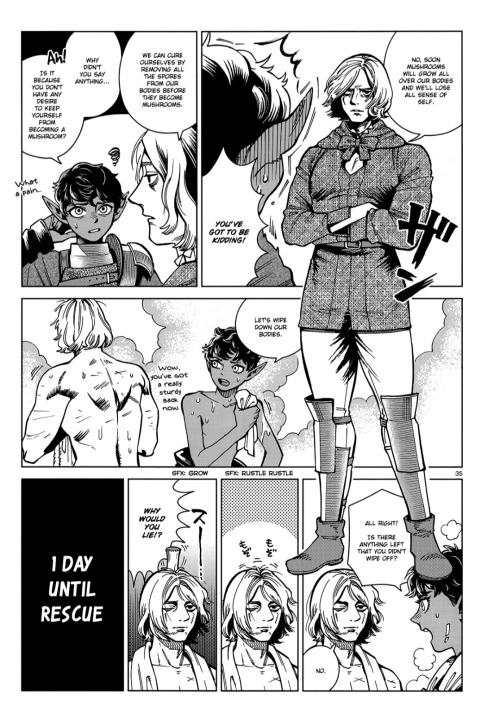
...Why would he lie? Except subconsciously he wants to die. Whether through inaction , literally wasting away, or the dungeon monsters getting him. His preference would be for the demon to finish him off, but his actions sometimes show that the goal itself is death, no matter what methodology.
-Mithrun is covered in self harm scars. We know that he acquired them after his time as the dungeon master because of this story extra:

- this is further supplemented by his fighting style in the dungeon. Every action shows he is clearly a knife fighter, and yet he is never seen with a knife. He always improvizes weapons or is handed weapons by his comrades during combat.
Some examples of this:


This is even played as a joke in one chapter where Mithrun reaches towards the ground for a weapon before ultimately teleporting Kabru as his improvized weapon instead :
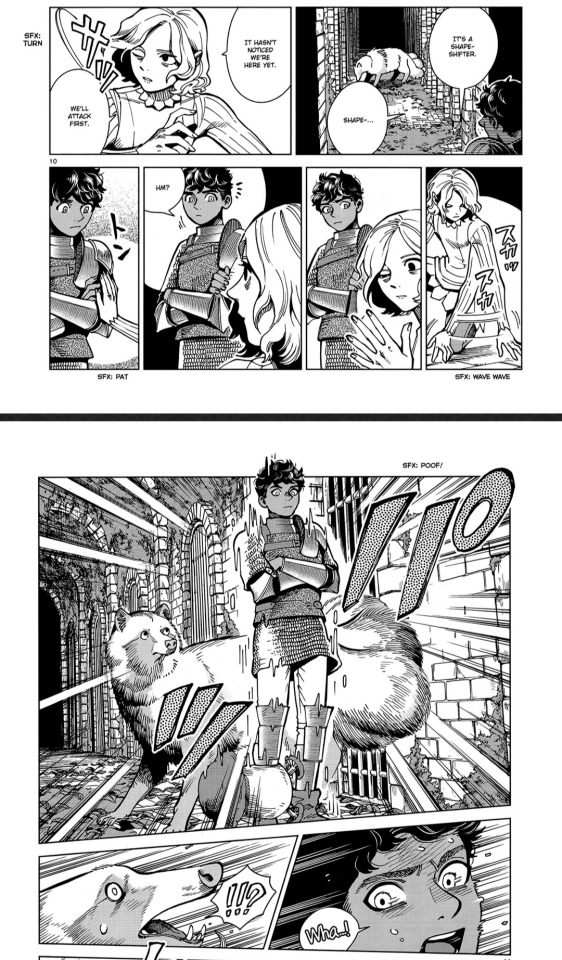
- which brings us to his teleportation abilities, it is extremely reckless for someone with no sense of direction and one eye leading to a lack of depth perception to rely on teleporting himself as his main trump card in fights. It shows a lack of value he puts on his own well being or survival
Although funny enough, the only time we ever see this go wrong in dungeon meshi is this extra where someone else, not Mithrun, is hurt:
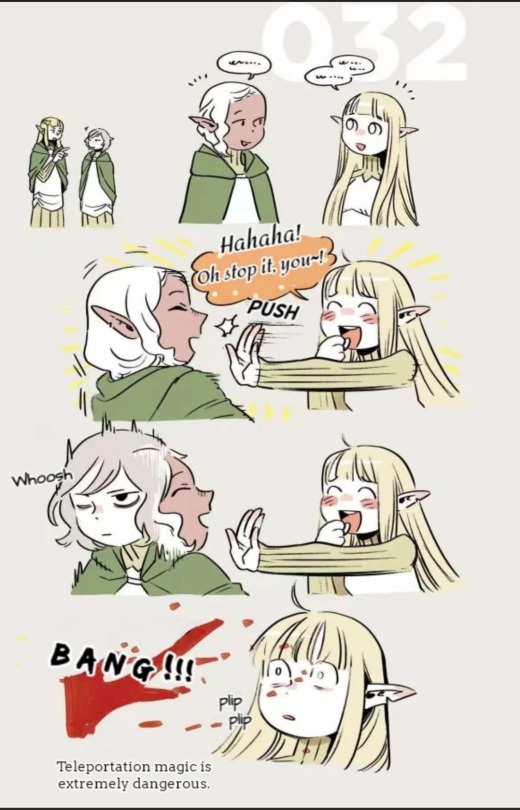
- the reader is led to believe that Mithrun's goal is to defeat the demon for the majority of the story but when he does face Marcille and the demon , his eye glows its original gray, signifiying his desire and he says:

Mithrun is not addressing Marcille, he is addressing himself and ultimately he realizes his true desire is death just as he is about to recieve it

So YOU have chosen death. I'VE failed. The one who chose death has always been Mithrun , aware or not.
Marcille as the demon's proxy kills him. It is his first death in the dungeon, in any dungeon . Once he is revived , he is a blank slate with no desires left from his old self pre dungeon master. We are able to see what has always been hinted at, and Kabru confirms later on: Mithrun is able to gain new desires as long as he chooses to live:

Mithrun must live and seek new desires, he already has by surviving his death wish and then choosing to try and defeat the demon.(as shown by his eye glowing gray once more) He is capable of new desires and will live and find new meaning

After all one of dungeon meshi's major themes is the cycle of death and life :
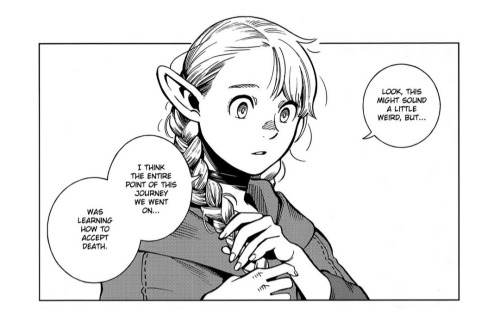
The main cast learns to accept death, Mithrun to accept life.
Its why having a passively suicidal character realize their behavior and make steps to seek not death, not just surviving , but choosing to live is so impactful.
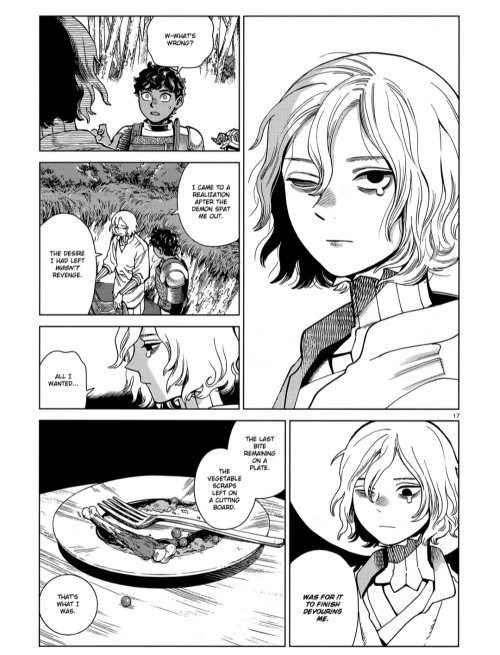
Once he accepts that, he is able to move on, his final words in the main story show that resolve. When talking about Falin he says this:
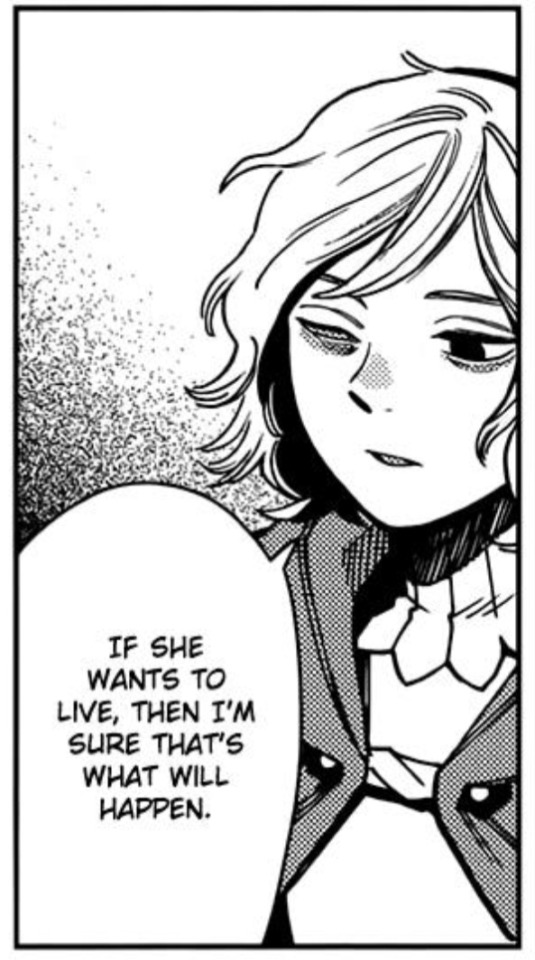
At the end of his quest for death, Mithrun chooses to live. As the text declares : your new life begins here
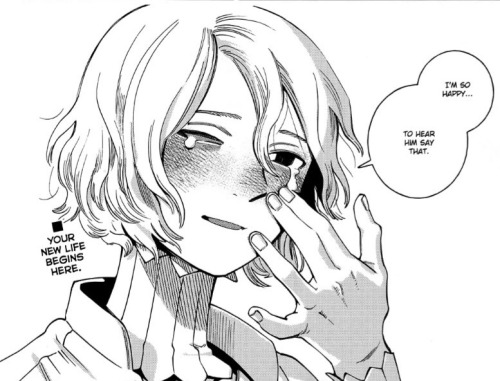
Dungeon Lords and the Human Need for Connection
When I came across these panels again the other day, it got me thinking about dungeon lord parallels again.

...And I spiraled until I was writing my thesis statement about how All Four Dungeon Lords (Yes, Even Laios, Stop leaving him out of these discussions) Are Actually the Same.
Firstly (because on some level everything is about Thistle to me) I thought about how the lion could have very likely given Thistle a similar offer when his loved ones started losing their souls/rebelling/etc. And yet, there is no sign that Thistle ever accepted such an offer, nor any sign that he used magic to forcibly change people's opinions, the way Marcille briefly threatened the party with while she was dungeon lord:

Instead, he ended up with the fucking dining table that drives me insane. Which probably means that either Thistle rejected the offer, or the lion sensed it wouldn't go over well and didn't even try it.
Making replicas of people doesn't seem to be an uncommon part of granting the dungeon lord's wishes. In his time, Mithrun actually took the demon up on it:

(Not pictured; the infamous lamia-version of his love interest.)
What makes Mithrun different from Thistle and Marcille in this instance is that Thistle and Marcille both became dungeon lords for the sake of specific people. Both were motivated by the terror of losing their most important people, and both told themselves everything they did was for the sake of protecting those people.
Because they were motivated by genuine love, copies or mind manipulation were not palatable. I think Thistle even in the late stages of his madness probably would not find these to be acceptable solutions. No matter how twisted, possessive, and obsessive his love became under the dungeon's influence, it was still from the fear of losing those original, irreplaceable people that he was doing all this. Even as his relationship with Delgal and the other Melinis fell apart over the years... even as he was left with only their soulless bodies... he would still rather cling to whatever was left.
Perhaps on some level, Thistle recognized the same thing that kept Marcille from following through with her threats:

Even in the state of endlessly chasing their desires as dungeon lords, they couldn't feel truly okay accomplishing it that way.
For Mithrun, meanwhile, the people in his fantasy world were a means to an end. It was all-encompassing insecurity and the pain of not being wanted that led him to become dungeon lord. His desire was not fixated on any specific people - it was broad enough and desperate enough that anyone could fulfill it. The thing is, Mithrun prior to becoming dungeon lord was by all accounts well-liked. But his emotional walls were up so high that not a single one of his admirers could make him feel known and cared for. The kind of crushing perfectionism he exhibited in that stage of his life often comes with a silent and equally crushing imposter syndrome. No one actually knew him, because Mithrun didn't let them, even though every aspect of his personality then was a desperate plea to be seen and liked. I think the sad truth is that, by the time he became dungeon lord, Mithrun didn't truly believe that happiness was something that could be found in other people. (It's telling that his wish was for a world in which he had never been discarded; perhaps for a world in which he never felt the need to put up those masks.)
In this respect, Mithrun is actually more alike to Laios than he is to Thistle and Marcille.
Laios was told again and again by the world that it was wrong to be who he was - that he was unlikeable when he acted the way that came naturally to him. The lion didn't bother asking Laios about replicas; those would be meaningless to him. Like Mithrun, Laios had lost all hope of being liked for who he was, but took it one step further: Laios had lost hope that he could find happiness in the human world entirely. At that point, all he wanted was an escape. To leave the pain of the human world behind and become someone, something, different. All he really needed in order to be tempted into it was the assurance that his friends would be safe.

All four of these stories have a pretty obvious throughline when you think about it: the deep, intrinsic need for human connection and what happens to someone when that need cannot be met.
All four of them were starving for connection. All four of them experienced alienation and isolation that made them desperate enough to turn to the demon.
Marcille (a half-elf whose unstable aging left her without peers) and Thistle (raised as the only elf in a kingdom of humans) both formed intense attachments to the few people they did become close to, and went off the deep end from fear of losing them.
Mithrun and Laios were both rejected by others for aspects of themselves that were out of their control, and tried to cope by developing masks that left them unable to feel accepted by the people still in their lives.
...So it's fitting, then, that genuine human connection is also what saved all four of them in the end.




(Thistle is a little arguable here; I personally don't think he died, but even if you do believe he died at the end of the manga- Yaad being able to connect and empathize with him is what gave him peace and solace in his final moments.)
Dungeon Meshi is about alienation and connection as much as it is about food and cycles of life. (Or more like, these themes are masterfully intertwined - food is used to represent love and connection over and over again. But that's a whole essay in and of itself!)
i actually think there's some significance in the fact that mithrun wears oversized shirt with open collar (it most likely belongs to laios) in the final arc of the manga. i mean, not just that kui simply wanted to draw him in oversized clothes, lol.
in all instances we see young (pre-dungeon) mithrun he's wearing clothes that hide his body as much as possible. which seems normal, until you see what other elves prefer to wear: most of them wear light short tunics with no sleeves and they don't usually even wear pants. here's a comparison to his brother's outfit, for example, as they stand next to each other.
![[ID] a manga panel from dunmeshi adventurer's bible depicting young mithrun and his brother standing next to each other. his brother talks about a person he likes (an elf with a long braid and forehead ornament). mithrun stands with his arms crossed, smiling. mithrun wears a tunic with high collar and long sleeves. his brother wears light sleeveless tunic with open collar and has a mobility aid. mithrun's narration says: "the fact that i had to respect him as an older brother despite him being inferior in every way... the fact that he was in love with someone way out of his league... the fact that my parents sent me to to the canaries instead of him... i couldn't forgive any of it" [End ID]](https://64.media.tumblr.com/0e8ff5437c253a0f1831acbb0aba0ece/31dc21e4e24afceb-7a/s500x750/32871c0f65e7e2fa110c902efcd28723ca5b9b4a.jpg)
it's not like his fashion choices are unique, but it certainly feels deliberate. he doesn't add any variation to his canary's uniform either, but that's not especially notable, i guess, because a lot of canaries don't do that (i mean, it's still their armor).
but in his perfect world he's also one of the few who always wears this type of clothes. never revealing himself. sitting a little further from everyone else.
![[ID] a manga panel from dunmeshi depicting mithrun and his friends from the time when he was a dungeon lord. they all sit at the table, talking. his friends wear variety of clothes, mostly light sleeveless tunics. mithrun sits with his arm crossed, wearing a tumic with high collar and long sleeves [End ID]](https://64.media.tumblr.com/725d87cf30b4710bf06e04031d03532a/31dc21e4e24afceb-94/s400x600/215ecf83593d9c31ab4223365fe9c4d94810636e.jpg)
![[ID] a manga panel from dunmeshi depicting mithrun from the time when he was a dungeon lord. next to him is the demon in a form of small goat. mithrun sits on the floor with sad expression, covered in cartoonish medical plasters. he wears tunic with high collar, light pants and boots [End ID]](https://64.media.tumblr.com/560373d5857260ce183c8aa8a9e4d6ba/31dc21e4e24afceb-02/s400x600/c37333ca9a8050dcbaa01fbcaa4d4ffaedeaa397.jpg)
he even lies in his bed fully clothed, like he can't ever bring himself to let his guard down, never showing his "true" skin to anyone.
![[ID] a manga panel from dunmeshi depicting mithrun and his romantic partner from the time when he was a dungeon lord. mithrun lies in his fancy bed under a blanket fully clothed (he wears the same high collar tunic). his partner is chimera: an elf with a long braid and the body of a snake. they sit next to his bed with their eyes closed [End ID]](https://64.media.tumblr.com/679841160956224848f2a08c00fe5871/31dc21e4e24afceb-40/s500x750/0ac7d3d7a0a19b4a9a6f26bc256ba8954366bf0f.jpg)
btw notice that his bed is a single bed, even though he's been living with his partner for 5 years at that point.
and that's the idea, isn't it? he never lets himself be truly vulnerable with anyone, even in his dungeon, where people are supposed to like him unconditionally. i think it adds something to the horrible scene with the demon: it's especially disturbing that the demon literally doesn't care how much of yourself you wanna hide, it sees (and eats) right through every protective layer. and we all know what the allegory of this scene is.
when mithrun loses all his desires, he no longer cares what clothes he wears. and in some twisted metaphorical sense it's heartbreaking to see him in a simple elven tunic when he's recovering, the one that doesn't hide any of his injuries or scars or terrible physique.
![[ID] a cropped-out image from daydream hour collection depicting mithrun in his recovery period. he look malnourished and apathetic, his hairs is long and unkempt. he wears nothing but a short sleeveless tunic, somilar to hospital gown. his body is covered with scars. his left eye is covered with bandages, small patch of blood is visible where his eye supposed to be [End ID]](https://64.media.tumblr.com/aeedb22e8fd7f4abefde6b4740da5b3e/31dc21e4e24afceb-75/s500x750/ad6046aa813e95aedca750db1d34c9684609657b.jpg)
he doesn't care to hide himself anymore, but it isn't on his own volition. it's something that was ripped away from him, as well as his privacy (a lot of people have to go through this when they're in medical care actually).
when he recovers and enlists to canaries again, he starts to wear full uniform again, but i don't think it holds much significance to him anymore. or at least he thinks it doesn't. we can see that cithis forces him to wear frilly dress at some point and it's implied that he goes along with it (cithis is still an asshole for that btw).
at this point he's fully focused on finding the demon, but i think the sad reality is that he's always been capable of developing new desires. i'd argue that there are already some things he cares about without realizing it, in the main story. but what's stopping him from actually realizing it at that point is that he's clinically depressed. his disability makes his life difficult; he lives with the idea that he's completely "broken", he accepted the reality of living like that and always goes along with what others make him do. so, he doesn't believe in his own privacy anymore. it’s actually something kabru talks about in the adventurer’s bible comic, when he tries to help mithrun to figure it out again, to help him see the value of privacy, of choosing what he wanna reveal of himself. mithrun needed a reminder that he still has this choice like anybody else.
![[ID] a few manga panels from dunmeshi adventurer's bible. panel 1: kabru wipes off sweat from his forehead and says: "if we condense the story like so... then i think it will do a better job letting people know the dangers of demons"
panel 2: mithrun's holding a perfectly round shiny rock in his hand. there's a caption on the rock that says "my past"
panel 3: mithrun looks at the rock and says: "you've formed it into a nice little shape, huh?" kabru answers: "it's better that way"
panel 4: kabru says with serious face: "there's no need for you to tell anyone and everyone the personal details of your life".
panel 5: mithrun looks pensive, his fist is closed around the rock now
panel 6: kabru asks: "how have you and your brother been getting along since then?". mithrun answers "quite well" [End ID]](https://64.media.tumblr.com/5b94e17182e98506b39f828c3bf5fab2/31dc21e4e24afceb-14/s500x750/bb841e6a44adc9288bc2ecd1682a859f59dcf221.jpg)
i think the scene where kabru asks him about his past for the first time is interesting in that sense. first of all, i like the symbolism of kabru unbuttoning mithrun’s collar and cuffs, revealing the scars underneath (a good amount of them is self-inflicted). he does so unthinkingly, but in his defence he doesn't know anything about mithrun yet. another interesting thing is that the first reaction mithrun has is covering his eyes with his hands. he's trying to hide. he supposedly has no desire to hide, but this reaction is almost instinctual to him. i think kabru notices this as well (of course he does) and i think it's one of the things that prompts him to voice his concerns about mithrun's privacy later.
![[ID] a few manga panels from dunmeshi.
panel 1: mithrun lies in his sleeping bag, looking sweaty and sick. he says "...you're an inquisitive one, aren't you? a personality trait like that is bound to get you killed in this dungeon".
panel 2: kabru looks at mithrun with irritation. a small text next to him says "whatever, just tell me"
panel 3: mithrun covers his eyes with his hands. he says "...i was..."
[End ID]](https://64.media.tumblr.com/780de66af0b9e52a92fbad6195714a71/31dc21e4e24afceb-b2/s500x750/687ed4728c9f96ffd822874c24736d7753f973a0.jpg)
so, what about that laios' shirt he wears in the final arc of the comic? he has to change his uniform's shirt for something else because it's covered in spider's guts. it's unclear if someone puts laios' shirt on him or if it's something he chooses to wear himself. regardless, it's still symbolic for his change. it's not particularly revealing or anything, but it's different from the type of clothes he usually wears, and it's tallman clothes. and in this final arc we can see a lot of his true feelings as well. he's visibly mad at kabru, he shows concern and tries to help marcille, he helps kabru to break out of his spiral. and obviously, in chapter 94 he reveals a lot of what he actually feels and think and shows genuine emotions other than anger. and I think it’s the first time he decided to be open and vulnerable on his own volition, probably in his entire life.
![[ID] two manga panels from dunmeshi.
panel 1: mithrun in the frame, looking sad, there's a tear in his right eye. he says "was for it to finish devouring me"
panel 2: an image of a plate with leftovers. mithrun says "the last bite remaining on a plate. the vegetable scraps left on a cutting board. that's what i was"
panel 1: [End ID]](https://64.media.tumblr.com/f8d7fd35cbc8ad99d0d56ab392da9e43/31dc21e4e24afceb-2f/s500x750/03e9610eb9d51ab1dbad3fd34d753174237e7af6.jpg)
we can see him wearing variety of clothes post-canon and it’s ambiguous how much of it he picked for himself. pattadol probably helps him a lot with choosing outfits and she also prefers high collars. but mithrun knows he can choose now; even if he doesn’t want anything in particular, he always can express his opinion or feeling, like he did with kabru’s food. he always can choose how much he wants to be seen. i’m just glad to see him wearing similar shirt with open collar and rolled-up sleeves on the cover of daydream hour book.
![[ID] a cropped-out image from the cover of daydream hour book, depicting mithrun and pattadol. mithrun stands with a wineglass in his hand, wearing a light tunic with open collar and rolled up sleeves, as well as tight pants and boots. part of the tunic is tied on the side in a fancy knot. pattadol is holding out her hand, clearly inviting him to dance. she wears a long tunic and pants, her sleeves are also rolled up. [End ID]](https://64.media.tumblr.com/59b9dbc61753fd5cc752dd1ed7997a39/31dc21e4e24afceb-5c/s500x750/807b0974a6544da2bb3372249565503282bd97b4.jpg)
-
 solaritys-world liked this · 2 weeks ago
solaritys-world liked this · 2 weeks ago -
 gendertheft reblogged this · 2 weeks ago
gendertheft reblogged this · 2 weeks ago -
 starlighttraveler-archive reblogged this · 2 weeks ago
starlighttraveler-archive reblogged this · 2 weeks ago -
 roty01 liked this · 3 weeks ago
roty01 liked this · 3 weeks ago -
 afishyperson liked this · 3 weeks ago
afishyperson liked this · 3 weeks ago -
 dancing-dawn liked this · 3 weeks ago
dancing-dawn liked this · 3 weeks ago -
 queenbee0524 liked this · 3 weeks ago
queenbee0524 liked this · 3 weeks ago -
 scalemodelarbysreplica liked this · 3 weeks ago
scalemodelarbysreplica liked this · 3 weeks ago -
 thatgenderfluidaroace reblogged this · 3 weeks ago
thatgenderfluidaroace reblogged this · 3 weeks ago -
 mold-for-breakfast liked this · 4 weeks ago
mold-for-breakfast liked this · 4 weeks ago -
 hell-hounding reblogged this · 1 month ago
hell-hounding reblogged this · 1 month ago -
 belmeran liked this · 1 month ago
belmeran liked this · 1 month ago -
 prehistoric-pal liked this · 1 month ago
prehistoric-pal liked this · 1 month ago -
 ramblinseahorsey reblogged this · 1 month ago
ramblinseahorsey reblogged this · 1 month ago -
 aniagb liked this · 1 month ago
aniagb liked this · 1 month ago -
 artandanimationaddiction liked this · 1 month ago
artandanimationaddiction liked this · 1 month ago -
 kudriaken liked this · 1 month ago
kudriaken liked this · 1 month ago -
 730px liked this · 1 month ago
730px liked this · 1 month ago -
 cerria liked this · 1 month ago
cerria liked this · 1 month ago -
 croissantk liked this · 1 month ago
croissantk liked this · 1 month ago -
 greatwyrmgold liked this · 1 month ago
greatwyrmgold liked this · 1 month ago -
 yeonjunsleftboob liked this · 1 month ago
yeonjunsleftboob liked this · 1 month ago -
 adriarii liked this · 1 month ago
adriarii liked this · 1 month ago -
 shrimptiddies liked this · 1 month ago
shrimptiddies liked this · 1 month ago -
 emiliaronson liked this · 1 month ago
emiliaronson liked this · 1 month ago -
 akihmorn liked this · 1 month ago
akihmorn liked this · 1 month ago -
 mercuryrising-svetam liked this · 1 month ago
mercuryrising-svetam liked this · 1 month ago -
 dat-some-spoopy-shit liked this · 1 month ago
dat-some-spoopy-shit liked this · 1 month ago -
 gengor reblogged this · 1 month ago
gengor reblogged this · 1 month ago -
 gengor liked this · 1 month ago
gengor liked this · 1 month ago -
 blacklight-carpet liked this · 1 month ago
blacklight-carpet liked this · 1 month ago -
 stalegerm reblogged this · 1 month ago
stalegerm reblogged this · 1 month ago -
 souborou liked this · 2 months ago
souborou liked this · 2 months ago -
 sage-thee-herbmaster reblogged this · 2 months ago
sage-thee-herbmaster reblogged this · 2 months ago -
 sage-thee-herbmaster liked this · 2 months ago
sage-thee-herbmaster liked this · 2 months ago -
 meanautisticenbian reblogged this · 2 months ago
meanautisticenbian reblogged this · 2 months ago -
 meanautisticenbian liked this · 2 months ago
meanautisticenbian liked this · 2 months ago -
 lidiacerv0s liked this · 2 months ago
lidiacerv0s liked this · 2 months ago -
 orioncipher liked this · 2 months ago
orioncipher liked this · 2 months ago -
 ruinstone liked this · 2 months ago
ruinstone liked this · 2 months ago -
 missimbalance liked this · 2 months ago
missimbalance liked this · 2 months ago -
 the-damnedest-creature reblogged this · 2 months ago
the-damnedest-creature reblogged this · 2 months ago -
 the-damnedest-creature liked this · 2 months ago
the-damnedest-creature liked this · 2 months ago -
 ramblinseahorsey liked this · 2 months ago
ramblinseahorsey liked this · 2 months ago -
 monsouppy liked this · 2 months ago
monsouppy liked this · 2 months ago -
 coremagpie liked this · 2 months ago
coremagpie liked this · 2 months ago -
 veribee liked this · 2 months ago
veribee liked this · 2 months ago -
 lunaraven0 liked this · 2 months ago
lunaraven0 liked this · 2 months ago -
 wastelandofreality liked this · 2 months ago
wastelandofreality liked this · 2 months ago